|
Updates on matters we have written about:
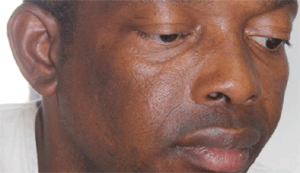 A
migrant's ordeal A
migrant's ordeal
聲gel Am璱car Col鏮 Quevedo is a black man from Honduras, a member of the downtrodden Garifuna people (descendants of African slaves and Carib and Arawak Indians, who live along the coast from Belize to Honduras).
聲gel's eight-year-old son was dying of cancer. This was in 2009. 聲gel conceived the desperate hope of getting to the U.S.A. and earning enough money for the medical treatment. It's something like two thousand miles across Mexico, and a horrendous journey for undocumented migrants, who get harassed, arrested, beaten, murdered — not long ago a whole trainload of such migrants was kidnapped and never seen again. 聲gel managed to get all the way to Tijuana at Mexico's far end, at the border with California. A “coyote,” a people-smuggler, promised to help him across this dangerous and heavily guarded border, but told him to wait a few days. Armed Mexican policemen stormed the house where 聲gel was staying. They kicked him, struck him in the ribs, punched him in the stomach, forced him to walk on his knees; took him to a military base, where he could hear the screams of other detainees. They put a plastic bag over his head until he was almost asphyxiated, stripped him, forced him to lick clean the shoes of other prisoners, calling him pinche negro, “fucking nigger.” The torture went on till he signed a written confession to a charge of being a member of a criminal gang. He later told a judge the charge was false. But he was thrown into prison, which was probably not pleasant for one who had contradicted the police. He was never brought to trial; he was lingering in “pre-trial detention.” When he had been there six months, his child died.
Amnesty International took up his case as part of its 2014 campaign against torture (which was focussed on Mexico, Morocco, Nigeria, Uzbekistan, and the Philippines). An Amnesty deletation visited 聲gel in prison. On October we learned that he had been released. A video shows him, with a remarkably forgiving smile, thanking all his sympathizers and looking forward to a better world.
They helped two foreign journalists
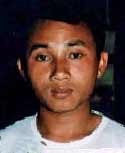 
Thao Moua and Pa Fue Khang, two men of the Hmong minority in Laos,
were arrested in June 2003 as they came out of the forest with two
journalists, Belgian and French, who were investigating the persecution
of the Hmong and for whom these two had been working as guides and
interpreters. The journalists were expelled; Thao Moua and Pa Fue
Khang, after being shackled and beaten with bicycle chains and after
a brief trial with a pre-written verdict, were sentenced to 12 and
15 years respectively. The Lyme Regis Amnesty group was one of those
that appealed persistently for them, and tried to get the help of
politicians and diplomats. There was no apparent response until
in July 2014, at one of the discussions on human rights between
the European Union and Laos, a member of the Lao delegation casually
revealed that Pa Fue Khang had been "pardoned" in May and Thao Moua
had been released in March 2013 - several years before the ends
of their sentences. In May 2015, the Laotian embassy in Brussels
wrote to a Belgian Amnesty member that Pa Fue Khang had been released
in the preceding February.
Longest on death row
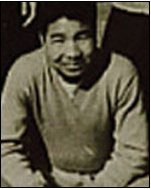 Hakamada
Iwao was arrested in 1966, and sentenced to death in 1968, for the
murder of his employer, his employer's wife, and their two children.
See our page on him for the unfairness
of his trial, the ridiculousness of the evidence against him, and
the inhumanity of Japan's death row system, in which he lived year
after year (including 28 years of solitary confinement) with the possibility
of being hanged every next morning. Also for the international campaign
for his exoneration, which included the principal judge at his trial. Hakamada
Iwao was arrested in 1966, and sentenced to death in 1968, for the
murder of his employer, his employer's wife, and their two children.
See our page on him for the unfairness
of his trial, the ridiculousness of the evidence against him, and
the inhumanity of Japan's death row system, in which he lived year
after year (including 28 years of solitary confinement) with the possibility
of being hanged every next morning. Also for the international campaign
for his exoneration, which included the principal judge at his trial.
At last on 27 March 2014 — 17 days
past his 78th birthday — he was granted a retrial, and released
from prison. He had been on death row longer than anyone else in the
world.
The prosecution filed an appeal against
the retrial and release. So Amnesty International, and AI Japan, continue
the campaign, urging the prosecution to drop its appeal.
Abolition in Maryland
Maryland abolished the death penalty: the repeal bill passed in the
Maryland House on March 15, 2013, by 82 to 56. to be signed into law
later by Governor Martin O'Malley. This was the result of hard work
by Amnesty and other abolition activists, and leadership by the governor.
He was exoected to commute the sentences of five prisoners still on
death row. A clause providing support for victims' families was squeezed
out of the bill, and the governor is was urged to include such funding
in the budget. Maryland was the 6th state in 6 years to abolish the
death penalty. The campaign moves to Delaware and Colorado, which
are also seriously considering repeal.
As pointed out by Norma Edwards, it was nice
that MArtin O'MAlley of MAryland, with his Irish name, abolished the
death penalty on or about St. Patrick's Day. “They're hanging
them in Ireland for the wearing of the green”—- no more.
A reprieve in Ohio
John Eley shot shopkeeper Ihsan Aydah of Youngstown, Ohio, in 1986.
It seemed that the retarded Eley had been sent into the shop by Melvin
Green, against whom Eley afterwards refused to testify. Eley was sentenced
to death and was to have been executed on 26 July 2012. One of the
judges, the detective who obtained a confession, and even the prosecutor
later said that if the defence had presented the mitigating evidence
they would have been against a penalty of death. In 2012 the parole
board voted 5-3 against the appeal; Eley was to be executed on July
26; we were (on July 3) among those writing to Governor Kasich; the
parole board's decision was not binding on him, and on July 10 he
commuted the sentence to life in prison without possibility of parole.
In Burma (called Myanmar by the military
regime that has ruled it since 1962), there was a release of 651 prisoners
on January 13, 2012, and a further 46 on July 3. Only a fraction were
political prisoners, but among these were some for whom Amnesty had
been appealing. We eventually learned (it took time) that they included
Myo Min Zaw, Ko Aye Aung, Khun Bedu, Khun Dee De, and Khun Kawrio.
All had been leaders of student protests, the first two in Rangoon,
the three Khuns in the Karenni ethnic region of eastern Burma; all
had been condemned to fantastically long prison sentences; their stories
included torture, hunger strikes, removal to prisons remote from their
families. The Greenville, S.C., group "adopted" Myo Min
Zaw in 1999; the Lyme Regis, England, group later took up this and
the other cases; and there were many other groups who had cause to
celebrate the release of their prisoners with a Toast to Freedom.
There still remained many prisoners of conscience in Myanmar.
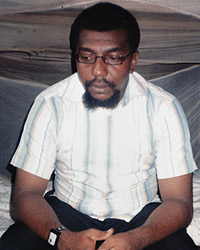 Patrick
Okoroafor was released on April 30, 2012. He had long been
featured in Amnesty International's holiday card campaigns, which
was how we first heard of him. He was imprisoned at age 14 and was
now 31. He was the youngest of seven youths who were accused, probably
falsely, of a robbery, tried with gross unfairness, and sentenced
to death; the others, including one aged 15, were shot. He suffered
terrible conditions in prison. We keep the fuller story at this
page. Patrick
Okoroafor was released on April 30, 2012. He had long been
featured in Amnesty International's holiday card campaigns, which
was how we first heard of him. He was imprisoned at age 14 and was
now 31. He was the youngest of seven youths who were accused, probably
falsely, of a robbery, tried with gross unfairness, and sentenced
to death; the others, including one aged 15, were shot. He suffered
terrible conditions in prison. We keep the fuller story at this
page.
Student who wouldn't keep quiet
 The
release, on Friday Jan. 13, 2012, of a few hundred out of the possibly
thousands of political prisoners in Burma (Myanmar) did not at first
seem to include Myo Min Zaw, but after several days of rumors and
bated breath, it did. The
release, on Friday Jan. 13, 2012, of a few hundred out of the possibly
thousands of political prisoners in Burma (Myanmar) did not at first
seem to include Myo Min Zaw, but after several days of rumors and
bated breath, it did.
He was one of the leaders of student protests
for democracy in 1996, dodged arrest and continued his activities
for a while, but was caught in 1998 and sentenced to 38 years, later
increased to 52! He was moved to successively more remote prisons,
was beaten, shackled, etc. His case was taken up by the Amnesty group
of Greenville, S.C., groups in New York and California, and the Lyme
Regis group in England. He was in prison for more than 13 long years,
and would have had three more of such spans to go, but perhaps for
the attention we tried to keep on him with thousnds of letters, cards,
and petition signatures.
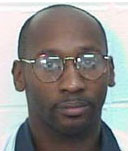 Not
proved innocent Not
proved innocent
That;s essentially the ground on which Troy Davis was executed. It's
supposed to be guilt that must be proved beyond reasonable doubt,
not innocence.
He was executed by the state of Georgia (U.S.)
on September 22, 2011, despite multiple doubts of his guilt and a
worldwide outcry including several Urgent Actions by Amnesty International,
calls for clemency from the Pope and the UN, huge petitions and vigils,
and waves of letters, emails and phone calls at the several times
when execution dates loomed.
In 1989 an off-duty policeman, Mark MacPhail,
working as a night guard at a Burger King, saw a homeless man, Larry
Young,being pistol-whipped by men who had demanded cash from him;
MacPhail went to intervene, and before he could draw his gun someone
shot him. No weapon or other physical evidence was ever found. Troy
Davis was arrested and charged on the basis of eyewitness testimony
given by seven people. After the 1991 trial, five of these retracted
their testimony, some saying they had been coerced by the police.
One of these was Benjamin Gordon, who had
just turned 16 at the time of the crime. In 2008 he signed a statement
that a relative of his by marriage told him he had shot the policeman.
Another witness, Sylvester “Redd” Coles, was the one who
originally went to the police, along with his lawyer, and said that
he had been fleeing the scene when shots were fired and that Davis
had been there; this was how Davis became the suspect. Several members
of the jury which gave the sentence of death have said that they would
now not do so.
In 2007 Davis came within two hours of execution
when the state Board of Pardons and Paroles issued a stay. It said
it would not allow execution “unless and until its members are
convinced that there is no doubt as to the guilt of the accused.”
Twice more, in 2008, execution dates were set,then stayed by the courts.
In 2009 the Supreme Court ordered a “federal evidentiary hearing”
hearing, which was held in 2010 by District Court Judge William Moore.
At this extraordinary hearing, defense lawyers wanted to call witnesses
who had given sworn statements that, after the 1991 trial, Coles told
them he was himself the actual killer. Judge Moore did not allow these
witnesses to testify because Davis's lawyers did not subpoena Coles
to testify. A technicaltity if ever there was one. Yet Moore asserted
that if the wirnesses had testified he could have assessed the truth
of what they said and it was probably that Coles was merely boosting
his image as a tough guy; that the new evidence was “largely
smoke and mirrors”; and that Davis was simply “not innocent.”
One who did testify at this hearing was Benjamin Gordon, who now for
the first time said he had actually seen the alternative suspect do
the shooting; he said he had not done so before because of fear. Judge
Moore felt that Gordon was “not credible.”
After this the last resort was the Board of
Parsons and Paroles (Georgia being one of three states where the Governor
did not have power of clemency). Despite its previous assertion, it
voted for death (by what majority of its five members, was not disclosed).
Lawyer wasn't ready
Martin Grossman was executed in Florida by lethal injection on Feb.
16, 2010. He was 19 in 1984 when he shot Margaret Park, a wildlife
warden on patrol. His co-defendant received a third-degree conviction.
Grossman, according to a forensic psychologist,
suffered "a high level of fear and depression, and parental neglect,
abandonment and mistreatment", which made it doubtful that his crime
was premeditated. But this only came out later; the defence presented
no mental health testimony to the jury. A second defence lawyer, hired
only two weeks before the sentencing, said he should have told the
trial judge that they were not ready. Grossman's lead trial lawyer
said in an affidavit to the Appeals Court that he and his defence
colleague had done a "very poor and ineffective job".
In his final statement Grossman said " . . . I
fully regret everything that happened that night, everything that
was done, whether I remember everything or not", and recited a Jewish
prayer. Jewish leaders, and the Vatican, were among those who appealed
for clemency, and Governor Charlie Crist received 49,000 letters,
phone calls, and emails; an online clemency petition was signed by
more than 34,000.
This was the 7th state killing this year in
the USA. Since the resumption of judicial killing in 1977, it was
the 69th in Florida and the 1195th in the USA.
Ricardo freed
Ricardo Ucán Seca (or Ceca) was released on December 31, 2009,
after serving more than 9 of the 22 years' imprisonment to which he
had been sentenced in June 2000. He was the peasant farmer in Yucatán
state of Mexico who, after killing in self-defense a neighbor who
threatened to rob him of his land, received an unfair trial, without
interpreter from Spanish to his own Mayan language. His case was taken
up, as an example of discrimination against indigenous Maya people,
by local activists called Equipo Indignación ("Team Indignation"),
and by Amnesty International. We long campaigned for him (http://humanrightsletters.com/MexicoUcan.htm)
and in January 2008 Tilly Lavenás and Guy Ottewell visited
him in prison at Tekax. The Interamerican Commission for Human Rights
agreed in 2008 to consider his case, and did so on Nov. 5, 2009. Jorge
Fernandez and Raul Lugo of Equipo Indignación went to Washington
to present Ricardo's case, along with Red Todos los Derechos para
Todas y Todos ("network of all rights for all people").
Some weeks later, the Mexico and Yucatán governments agreed
to a friendly settlement. Equipo Indignación volunteers said
that if this did not come to pass by Humanr Rights Day, Dec. 10, they
would protest outside the governor's palace. The release came on the
last day of the year, and on Jan. 2, 2010, Cristina Muñoz of
Equipo Indignación sent us her press release (“Don Ricardo
Ucán, libre!”).
A Briton's death in China
Akmal Shaikh, a British citizen from London, with three children,
mentally ill for many years with a probable bipolar disorder, traveled
to Poland. He behaved bizarrely, wanted to become a pop star though
he had no singing experience, and was tricked by a criminal gang,
who promised him introductions to people in the music business. They
arranged for him to fly to Kyrgyzstan, from there to Tajikistan, then
on 12 Sep. 2007 to Urumqi, capital of Xinjiang, the northwest province
of China. He was arrested on arrival. In a suitcase the gang had asked
him to carry were found four kilograms of heroin — of which he
disclaimed knowledge. He was imprisoned; in October 2008, after a
half-hour trial in which not all the evidence was heard, he was sentenced
to death. The British embassy and the charity Reprieve offered to
arrange for a mental health assessment, but no such examination by
a doctor was allowed. According to China's Criminal Law, Article 18,
the mentally ill should receive medical treatment and reduced sentences.
Despite intensive appeals from British authorities and his family,
two of whom traveled to China, he was killed (by lethal injection
or by a bullet in the back of the neck — accounts differ) on
29 Dec. 2009, at the age of 53 — the first British or indeed
European Union citizen to be executed in China for at least a century.
It was suspected (by Reprieve) that China used the case to punish
Britain because Gordon Brown had implicitly blamed China for wrecking
the Copenhagen world climate conference. "Face" is more
important than a man's life or the planet's.
Some releases in Sri Lanka
We appealed in November 2009 for the 260,000 detainees being kept
under miserable conditions in camps after the crushing in May of the
Tamil Tiger rebellion. On Dec. 1 several thousand were allowed to
leave, though told they must register wherever they go and must return
within 10 days. An estimated 127,000 civilians are still in the camps.
China's revenge on the Uighurs
We appealed on 9 Nov. 2009 for nine people (apparently eight Uighurs
and one with a Han Chinese name) sentenced to death. But later the
same day Chinese authorities announced that all nine had been executed,
at an unstated date. They had been convicted, after unfair trials,
of robbery, arson, or murder during riots on July 5, including attacks
on Chinese immigrants. These riots were a reaction to the crackdown
by police on a peaceful protest against the killing of Uighur migrant
workers in a distant part of China. Many more Uighurs are in detention
awaiting trial.
The Uighurs, Turkic in speech and Muslim in religion, are the native
people of Xinjiang (formerly known as Sinkiang or Chinese Turkestan
or Eastern Turkestan), the high, dry region north of (and even larger
than) Tibet. Another of their grievances is that China has begun to
demolish and rebuild one of their ancient cities, Kashgar.
She kidnapped six policemen?
Jacinta Francisco Marcial, for whom we wrote on August 24,2009,
was released on or just before September 16. She was an Otomi Indian,
non-speaker of Spanish, aged 46, mother of six, making a living by
hawking ice cream. In March 2006, agents of the Mexican Federal Investigation
Agency made a raid for pirate DVDs in a market on Santiago Mexquititlán
square in Querétaro, provoking a protest. Six of the agents
claimed that some stall holders kidnapped them and held them hostage.
In their original statements the agents made no mention of Jacinta.
A month later, after seeing a photo in a local newspaper that showed
Jacinta walking behind the crowd of protesters, the agents accused
her of involvement, and this photo was the only evidence against her.
Many witnesses testified that she took no part in the protest, and
during it was seen selling ice cream and attending mass. The trial
was an unfair one in which she had no interpreter and the state-appointed
public defender never spoke to her to explain her rights or defence.
In August 2006 she was sent to prison for 21 years. When she had served
three, Amnesty International adopted her as a prisoner of conscience
in August 2009, and she was released the same month.
This is an example of the effectiveness of international outcry.
There may be many little people like Jacinta imprisoned in obscurity
for absurd reasons. As soon as the absurdity was noticed internationally,
Mexico was shamed into releasing her.
An Uighur intellectual
Ilham Tohti, for whom our group wrote, was released on 23
August 2009. An economics professor, he was editor of a website for
the Uighur people (the native people of Xinjiang, which is ruled by
China). After the mass demonstrations by Uighurs on 5 July, Chinese
authorities said his website had fuelled violence. He says he would
never agree with using violence. He was taken from his home on 8 July
and imprisoned in Beijing, without charge. He says he was not tortured,
but was questioned by police "day and night". He remains
under surveillance; police told him not to criticize the government
or he will face formal charges and punishment.
What the jury wasn't allowed to hear
Dennis Skillicorn was put to death in Missouri in the first few
minutes of May 20, 2009.
In 1994 he and two others, named Nicklasson and DeGraffenreid, took
advantage of the kindness of Richard Drummond, who stopped to help
them with their broken-down car. At gunpoint they made him drive to
a lonely spot; then Nicklasson took him away into a field and shot
him. After his arrest in October 2004, Nicklasson said he had meant
to tie Drummond up and leave him, but had "snapped" (at
something the victim said?). Nicklasson consistently said that Skillicorn
did not know Drummond would be killed.
Thus Skillicorn was party to a nasty form of robbery, but not to murder.
Yet at Skillicorn's trial Nicklasson's statement was not allowed into
evidence; the jury never heard it. Why? — because it counted
as "hearsay". This has to count as one of the most outrageous
of the technicalities of American law. The state was required to prove
that Skillicorn had "after deliberation" aided or encouraged
Nicklasson to do the killing, and the jury decided he had done so.
The jury foreman later said he would not have voted for death if he
had known of Nicklasson's statement. Nicklasson was also sentenced
to death, but as yet has no execution date. DeGraffenreid was sentenced
to life imprisonment.
Skillicorn was repentant ("for the last 15 years I've lived with
the remorse of my actions" was his final statement) and in prison
worked with young offenders and terminally ill prisoners; founded
a program that organized visits by inmates' children and families,
and helped inmates develop parenting skills. Many religious and civic
leaders, and former and current staff members of the Missouri Department
of Corrections, supported the clemency petition, but the governor
denied it.
This was the first state killing in Missouri since October 2005, the
29th this year in the USA. Since the resumption of judicial killing
in 1977, it was the 67th in Missouri and the 1165th in the USA.
Healer of the tortured in danger of torture
In Sudan, Mohammed El Mahjoub was released without charge on April
17, 2009.
He was acting director of the Amal center for the treatment and rehabilitation
of victims of torture, in El Fasher, North Darfur. After the International
Criminal Court on March 4 issued a warrant for the arrest of Sudan's
President Omar El Bashir for war crimes and crimes against humanity,
aid agencies were expelled and there was harassment of human-rights
defenders. The Amal centers at El Fasher and at Nyala in South Darfur
were closed down. On 11 April Mohammed El Mahjoub was arrested from
his home by the National Intelligence Service. For six days he was
held incommunicado, and Amnesty International, concerned that he was
himself at risk of torture, issued an Urgent Action (UA 101/09 of
14 April). Happily, on his release he was in good health and said
he had not been tortured.
A mother whose children turned their thumbs down
on her
'Aisha Ghalib al-Hamzi was executed in Yemen on 19 April 2009
for the murder of her husband in October 2003. All seven of her children
refused to pardon her. In Yemen, relatives of the victim may seek
execution, grant pardon for monetary compensation, or grant pardon
freely. We don't know whether 'Aisha had been suffering intolerable
abuse from her husband, as in other recent cases of women in Muslim
countries driven to kill their husbands or employers. I (Guy) called
my human-rights book Think Like a Mother. Perhaps it is more
nearly universal for mothers to agonize for their children than the
other way around.
A state outgrows the death penalty
New Mexico became the second US state since 1965 to abolish the
death penalty. It hadn't seemed certain that the governor would sign
the bill passed by the state legislature, but a lot of people wrote,
he signed it on March 18, 2009, and we supported him with letters
of gratitude.
Condemned by planted evidence?
Edward Bell, a Jamaican national, black, aged 44, with probably mental
retardation, was killed by lethal injection on the evening of Feb.
19, 2009.
In 1999 in Winchester, Virginia, white police Sergeant Richard Timbrook,
chasing a fleeing suspect, was shot as he climbed over a fence. Another
officer said the shooter was dressed in black. Police conducted a
meticulous day-long search for the murder weapon, but found none.
Then they left the crime scene unsecured for several hours. Next morning
they returned, found Edward Bell hiding in the basement of a nearby
house, and "found" the gun in an obvious location under
the house's porch. Forensic testing showed that it was the murder
weapon; DNA on it was a mixture from at least three people, and neither
excluded nor identified Bell. Rather than being dressed in black,
Bell was wearing a jacket with reflective stripes on its sleeves that
"lit up like a Christmas tree". He said he had fled when
people he did not realize were police got out of a car and ran toward
him, and hid when he heard the gunshot.
There was another person in the area who was fleeing the police but
was never investigated. The prosecution produced a witness, Terry
Johnson, who was in jail with Bell before the trial and who testified
(not under oath) that Bell had confessed to the murder and that he,
Johnson, had not been offered anything by the state in return for
his testimony. He later signed an affidavit under oath that when first
approached by the authorities, he had told them repeatedly that he
knew nothing about the case; that the prosecutor promised a reduction
in his own prison sentence, as well as relocation to a more favorable
prison, and contact visits with his family and girlfriend.
At the sentencing phase, Bell's court-appointed lawyer, who had never
before handled a capital case, failed to tell the jury of any mitigating
evidence. A later investigator with experience in over 200 cases described
this as "the most disorganized case" she had ever tried
to work on. The trial lawyers consistently failed to respond to her
efforts to carry out her work. Such a wealth of mitigating evidence
about Bell and his family was later found that one of the jurors wrote:
"It was very important for me to hear about Eddie Bell's background.
I was undecided at sentencing and I wanted to hear something, anything
about Eddie Bell. We were looking for something mitigating, some reason
not to sentence him to death, but we were given nothing by his lawyers..."
The US District Court in 2006 concluded that Bell had had deficient
representation and the Virginia Supreme Court's ruling to the contrary
was unreasonable. But this was overridden by later courts and the
governor.
Governor Kaine's words, five hours before the execution: "Having
carefully reviewed the petition for clemency and judicial opinions...
I find no compelling reason to set aside the sentence that was recommended
by the jury, and then imposed and affirmed by the courts. Accordingly,
I decline to intervene."
Edward Bell's last words: "To the Timbrook family, you definitely
have the wrong person. The truth will come out one day. This here
— killing me — there's no justice about it."
There are some cases where it can't help appearing that police are
determined to convict someone in revenge for the killing of one of
their own.
This was the 1st state killing this year in Virginia, the 14th in
the USA. Since the resumption in 1977, it was the 103rd in Virginia
and the 1150th in the USA.
Spared for blood-money
Reza Alinejad was released on December 3, 2008, from Adelabad prison
in Shiraz, Iran.
At age 17, he had been attacked by bullies wielding martial-arts weapons;
defended himself with a knife; one of them died. By religious law
the family of the dead bully could accept blood money in lieu of execution.
Reza's father had a month to raise one billion Iranian rials, desperately
tried to sell his house, was afraid that even if managed in time it
would not be enough. But apparently he succeeded and the victim's
family accepted it. (We are not told whether Reza's family is now
houseless.)
We learned about Reza's release on the morning of Dec. 10, Human Rights
Day, when we were putting on an event with an Iranian speaker, so
we were able to say that "For example, one of Amnesty's Urgent
Actions that came today was about yet another Iranian death-penalty
case — though of the rare kind with a happy ending." Happier
would be an end to the grotesque blood-money system.
Campaigner against torture released
Osman Hummaida was released on Nov. 28, 2008. He had been in incommunicado
detention since Nov. 24, and had once before been imprisoned for a
year and a half. He had been director of the Sudanese Organization
Against Torture.
Turkey acknowledges a police crime
Ozgur Karakaya and Cihan Gun were released on Oct. 15, 2008, from
Metris prison in Istanbul.
After their arrest on Sep. 29, they and Engin Ceber were beaten so
badly over several days that Engin Ceber died. The Minister of Justice
(one of those we wrote to) recognized that Engin Ceber died as a result
of torture, and took the unprecedented step of publicly apologizing
to the family. And 19 state officials were suspended pending an inquiry
into the allegations of torture.
Executed though the real killer owned up
Gregory Wright was lethally injected in Texas on October 30, 2008,
for the stabbing of Donna Vick in 1997. John Adams reported the murder,
accusing Wright. In 2008 Adams took the sole blame on himself: "I
want the record clear that Greg Wright is innocent of the crime he's
here on death row for. If you kill him your killing a innocent man."
In his final statement, Gregory Wright said: "John Adams is the
one that killed Donna Vick... I was in the bathroom when he attacked.
I am deaf in one ear and I thought the TV was up too loud. I ran into
the bedroom. By the time I came in, when I tried to help her with
first aid, it was too late... I have done everything to prove my innocence.
Before you is an innocent man."
This was the 14th state killing this year in Texas, the 30th in the
USA; since the resumption in 1977, it was the 419th in Texas and the
1129th in the USA.
Plenty of witnesses — but they say they
were coerced
Troy Davis, for whom we have appealed over and over again,
received on Oct. 24, 2008, a stay of execution from the federal appeals
court in Atlanta, Georgia. His latest execution date had been set
for Oct. 27. He had been convicted of the killing of police officer
Mark MacPhail in 1989. There was no physical evidence pointing to
Davis; the only evidence was that of 9 supposed witnesses, 7 of whom
recanted their testimony implying that it was forced; the remaining
two were a police officer and the other principal suspect. But courts
had maintained that new evidence of innocence came too late to be
considered. On Sep. 23 he was just hours from execution when the US
Supreme Court issued a stay; later, decided not to hear the case.
This latest stay is conditional: Davis has to make a showing he can
meet the "stringent requirements" to pursue another round
of appeals.
Iran begins to limit its death penalty —
maybe
Iran on Oct. 16, 2008, outlawed the death penalty for juveniles
(people whose offences were committed when they were under 18). A
senior Iranian judiciary official issued a directive to judges to
abolish execution for juveniles and replace it with life imprisonment
with possibility of parole. Hossein Zabhi, Assistant Attorney for
Judicial Affairs (it is not clear in The Independent's article whether
he is the senior official referred to), told the state-run news agency
that "in cases of good behaviour and signs of rehabilitation,
juvenile offenders may qualify for conditional release under Islamic
compassion guidelines." The decision is not legally binding until
it has been ratified by the Iranian parliament. The judiciary in 2004
issued a similar directive, which was largely ignored by judges. Up
to now Iran has led the world in executing juveniles. There are about
130 on death row. Six have been arrested so far in 2008. The latest
known to be executed was Behnam Zare, hanged in Shiraz on Aug. 26
for a crime committed when he was 15. Since January 2005, Iran has
been responsible for 26 of the 32 known executions of juveniles worldwide.
The other states defying international law by executing juveniles
are Sudan, Saudi Arabia, Yemen, and Pakistan.
A tragedy
Jack Alderman, of Georgia: in 1974, his wife Barbara Jean was
murdered. John Brown confessed to the killing, but claimed that Jack
had promised to pay him for it. For this Brown got a light sentence,
was in prison for 12 years, and after getting out committed various
crimes against young women and children. Jack was sentenced to death.
Two jurors said afterwards that if they had known of the plea bargain
they would not have voted for the death penalty. Jack was offered
life if he would plead guilty; he refused to confess to something
he had not done. According to a passionate letter from a minister
who knew him well, Jack was a model prisoner, a peacemaker, an altogether
shining character. Several times, the Georgia Board of Pardons and
Paroles declined to grant clemency hearings. It held a last hearing
on the day of execution, September 16, 2008; Jack's elderly and ill
father was brought from his trailer park home in Thomaston to Atlanta
to testify; this last appeal was turned down. Jack was put to death
about 7 p.m. The execution by lethal injection took about 14 minutes.
He was 56. We suggest that this story is close to the extreme of tragedy
and might provide someone with the outline for a novel.
Executing a boy from another country
José Ernesto Medellín Rojas, a Mexican national, was
executed in Texas on August 5, 2008. He was barely 18 when he participated
in the 1993 murder for which his two defendants, who were 17, had
their death sentences commuted. His trial had been unfair in that
his court-appointed lawyer spent his time trying to keep himself out
of jail for unethical practices; and Texas never advised Medellín,
and advised his consulate four years too late, of his right to receive
Mexico's extensive consular assistance. The execution thus violated
international law, and defied worldwide appeals including by Mexico
and UN Secretary-General Ban Ki-moon. This was the 5th state killing
this year in Texas, the 17th in the USA; since the resumption in 1977,
it was the 410th in Texas and the 1116th in the USA.
(It's only a bit less than ten years since Tilly as a journalist had
to cover the USA's 500th modern-times execution, in South Carolina.)
Killing not the killer but the one who stood
by
Dale Leo Bishop was executed on July 23, 2008. Governor Haley Barbour
of Mississippi denied clemency even though the man who actually did
the killing to which Bishop was a rather passive assistant is serving
a life sentence. This was the 1,113rd execution in the USA since 1977,
and the 14th this year; in Mississippi, the 10th since 1977, and the
2nd this year.
A reprieve in Oklahoma
Kevin Young was to be executed on July 22, 2008. On July 15 Governor
Brad Henry granted a 30-day stay to review the clemency recommendation
of the Pardon and Parole Boad; and on July 24 he accepted that recommendation
and commuted the sentence to life imprisonment. He said: “This
was a very difficult decision and one that I did not take lightly.
I am always reluctant to intervene in a capital case, and I am very
respectful of a jury’s verdict, the prosecutors who tried the
case and the victim’s family who suffered because of the crime.
However, after reviewing all of the evidence and hearing from both
prosecutors and defence attorneys, I decided the Pardon and Parole
Board made a proper recommendation to provide clemency and commute
the death sentence. As a result, Kevin Young will be punished by serving
the rest of his life behind bars without the possibility of parole.”
This was only the second time Governor Henry had granted a clemency
recommendation.
A reprieve in Alabama
Also on Aug. 1, it was announced that Thomas Arthur had been granted
a stay of execution on July 30, they day before he was to have been
put to death.)
A loss in Oklahoma
Terry Lyn Short, whose guilt was highly doubtful, was executed
on June 17, 2008. This was the 1106th judicial killing in the USA
since the resumption in 1977; the 87th in Oklahoma; the 7th in the
USA this year.
A reprieve in Virginia
Percy Levar Walton was to be executed on June 10, 2008. This would
have been Virginia's 100th execution in modern times.
On June 9, Governor Tim Kaine commuted the death sentence to life
in prison without possibility of parole. He decided that Walton's
mental state (he shows virtually no awareness of the world outside
himself) is such that he could not have understood what was to happen
to him or why. Thus killing him would contravene the Supreme Court's
ruling that it is unconstitutional to execute a person who is mentally
incompetent. We sent messages of appreciation to the governor.
|


 A
migrant's ordeal
A
migrant's ordeal

 Hakamada
Iwao was arrested in 1966, and sentenced to death in 1968, for the
murder of his employer, his employer's wife, and their two children.
See
Hakamada
Iwao was arrested in 1966, and sentenced to death in 1968, for the
murder of his employer, his employer's wife, and their two children.
See  Patrick
Okoroafo
Patrick
Okoroafo The
release, on Friday Jan. 13, 2012, of a few hundred out of the possibly
thousands of political prisoners in Burma (Myanmar) did not at first
seem to include Myo Min Zaw, but after several days of rumors and
bated breath, it did.
The
release, on Friday Jan. 13, 2012, of a few hundred out of the possibly
thousands of political prisoners in Burma (Myanmar) did not at first
seem to include Myo Min Zaw, but after several days of rumors and
bated breath, it did.